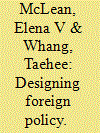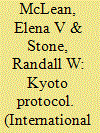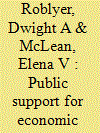|
|
|
Sort Order |
|
|
|
Items / Page
|
|
|
|
|
|
|
| Srl | Item |
| 1 |
ID:
134152


|
|
|
|
|
| Publication |
2014.
|
| Summary/Abstract |
The literature on economic sanctions has long studied sender countries' policymaking as a simple choice between imposing sanctions to extract concessions from the targeted country and doing nothing. We depart from this simplifying assumption and analyze sanctions as a multifaceted foreign policy instrument. We argue that senders design sanction policies in response to policy preferences of two domestic constituencies. Voters expect a response to an international dispute in the form of some policy, such as economic sanctions; hence, the sender's policymakers seek to demonstrate their competence in foreign affairs by imposing sanctions. Once the policymakers announce the use of sanctions, special interest groups that stand to experience economic losses when this foreign policy is implemented pressure the policymakers to choose sanction measures limiting such losses. As a result, the policymakers design sanction policies to include measures that will be less detrimental to special interest groups. We test our theoretical argument using the Threat and Imposition of Sanctions data and show that, while pressures from public opinion increase the likelihood of sanctions, special interest groups that benefit from the relationship with the target country are associated with a lower probability of the use of sanction measures that would impose substantial costs on domestic interest groups.
|
|
|
|
|
|
|
|
|
|
|
|
|
|
|
|
| 2 |
ID:
096691


|
|
|
|
|
| Publication |
2010.
|
| Summary/Abstract |
What is the relationship between international cooperation and the success of economic sanctions? Although it is commonly assumed that international cooperation is an important condition for the effectiveness of sanctions, empirical results have been mixed. We focus on the role of the sanctioned country's major trading partners and develop a theoretical model that shows how their actions can affect the probability of sanctions success by raising or decreasing resistance costs to the sanctioned country. We then derive hypotheses from the theoretical model and test them using fully structural estimation. The empirical results lend support to the theoretical expectation that the sanctioner is more likely to succeed if it has the support of the sanctioned country's major trading partners. We also find that international cooperation may be less crucial if sanctions are imposed by the sanctioned country's main trading partner because such sanctions have a higher probability of success.
|
|
|
|
|
|
|
|
|
|
|
|
|
|
|
|
| 3 |
ID:
111743


|
|
|
|
|
| Publication |
2012.
|
| Summary/Abstract |
The politics of ratifying the Kyoto Protocol may suggest a two-level game; yet, our quantitative analysis shows that ratification constraints did not affect bargaining over the Protocol, nor did bargaining outcomes affect ratification. The politics of the Kyoto Protocol are best understood as an example of the 'Europeanization' of international politics: European countries subordinate their domestic politics to international cooperation, and the European Union emerges as a key agenda setter. We find that European countries ratified the Protocol in lock step and offered selective incentives-such as EU accession-to most of the participants. Case studies of Russia and Poland confirm our interpretation of the empirical findings.
|
|
|
|
|
|
|
|
|
|
|
|
|
|
|
|
| 4 |
ID:
139790


|
|
|
|
|
| Summary/Abstract |
Existing studies of foreign aid suggest that donor countries' economic groups, such as exporters, should be generally opposed to multilateral aid because multilateral flows do not allow donor countries to tie their aid implicitly or explicitly to the promotion of their domestic economic interests. However, economic groups can actually benefit from some types of multilateral aid, and this serves as an incentive for donor governments to support international organizations generating the benefits. I test my argument using data on aid allocated to the Multilateral Fund for the Implementation of the Montreal Protocol and the Global Environment Facility, and international trade by commodity. I find robust empirical support for the argument that when donors' domestic economic groups are likely to gain from opportunities created by international environmental organizations' programs, donor governments increase aid allocations to these organizations.
|
|
|
|
|
|
|
|
|
|
|
|
|
|
|
|
| 5 |
ID:
160574


|
|
|
|
|
| Summary/Abstract |
Countries use economic sanctions as a way to force their opponents to make policy concessions. Such external pressure may, as the designers of sanctions often intend, affect the degree of domestic support for the target's political leaders. It may even threaten the leaders’ survival in office. We investigate how these dual pressures—preference for policy concessions and concern about target leaders’ political future—shape the use of sanctions in the context of political relations between the sanctioning and sanctioned countries. The political relations between the two countries matter because a decline in the likelihood of the target leader's political survival results in a cost for the sanctioner when the target is a friendly regime and generates a benefit when the targeted regime is an adversary. Therefore, we argue, and show statistically, that economic coercion is more likely for friendly governments when they are politically stable and unfriendly governments when they are politically vulnerable. We illustrate our causal mechanism using declassified primary sources for two case studies of US sanctions against Chile.
|
|
|
|
|
|
|
|
|
|
|
|
|
|
|
|
| 6 |
ID:
152898


|
|
|
|
|
| Summary/Abstract |
What are the determinants of public support for the government’s foreign policy? We shed light on this question using experiments investigating public support for economic sanctions. Our results suggest that humanitarian concerns are associated with individuals’ decisions to support the use of sanctions against a target country. We find that high levels of public pain in the target country have a negative relationship with the likelihood of supporting sanctions, and tailored sanctions, which aim to shift damage from the targeted country’s population to its leadership, have a higher probability of support than comprehensive sanctions. At the same time, policy effectiveness shapes public support, but only indirectly—through individuals’ subjective evaluations rather than given estimates of policy success. When subjective evaluations of effectiveness are higher, sanctions receive more public support. Recalled effectiveness, on the other hand, has no direct effect on the decision to support the sanction policy.
|
|
|
|
|
|
|
|
|
|
|
|
|
|
|
|
|
|
|
|
|